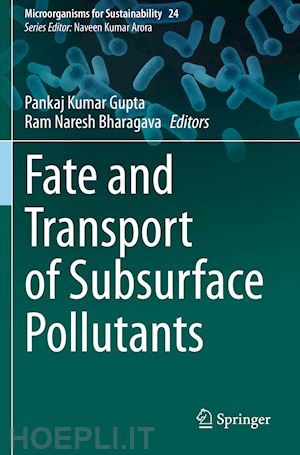
Questo prodotto usufruisce delle SPEDIZIONI GRATIS
selezionando l'opzione Corriere Veloce in fase di ordine.
Pagabile anche con Carta della cultura giovani e del merito, 18App Bonus Cultura e Carta del Docente
This volume offers detailed information on the behaviour of various water pollutants, and on the principles and concepts of groundwater flow and transport. It will help readers to understand and execute the planning, supervision, and review of solute transport and groundwater modeling projects. The book also discusses the role and fate of elements that have been identified as major contaminants in surface and subsurface waters, and their adverse effects on ecology and human health. The book explores this theme throughout four sections – a. Understanding Soil-Water Systems, b. Fate and Transport of Pollutants, c. Physico-Chemical Treatment of Wastewater and d. Microbial Techniques Used to Decontaminate Soil-Water Systems. Introducing readers to a range of recent advances concerning the fundamentals of subsurface water treatment, it offers a valuable guide for teachers, researchers, policymakers, and undergraduate and graduate students of hydrology, environmental microbiology, biotechnology and the environmental sciences. It also provides field engineers and industrial practitioners with essential support in the effective remediation and management of polluted sites.
Dr. Pankaj Kumar Gupta has been a postdoctoral fellow at the Faculty of Environment, University of Waterloo since January 2019. The majority of his works focus on two areas: (1) understanding the occurrence of bio-geo-chemical interactions when pollutants migrate into groundwater systems; and (2) developing remediation strategies. He received his Ph.D. from the Department of Hydrology, Indian Institute of Technology Roorkee with a dissertation on “Fate and transport of LNAPL under varying subsurface conditions”. He has received an AGU Student Travel Grant (2017), JPGU Travel Grant (2018), and EXCEED-SWINDON & DAAD Germany Grant (2018). He serves as an editorial board member for SN Applied Sciences and Frontiers in Water. He has published 15+ research papers, ~20 book chapters, and two popular science articles. He has reviewed several research articles for reputed journals including RSC Advances, Groundwater for Sustainable Development,ASCE JEE, ASCE Irrigation and Drainage, Env. Sc, Pollution Research, Ecohydrology, J. of Contaminant Hydrology etc. Further, he has led many site restoration and remediation consultancy projects at polluted industrial sites in India.
Ram Naresh Bharagava is an Assistant Professor at the Department of Microbiology, Babasaheb Bhimrao Ambedkar University, India. He received his B.Sc. in Biology from the University of Lucknow, and his M.Sc. in Molecular Biology and Biotechnology from Govind Ballabh Pant University of Agriculture & Technology (GBPUAT), Pantnagar, India. He completed his Ph.D in Microbiology at the Indian Institute of Toxicology Research (CSIR-IITR), Lucknow and Pt. Ravishankar Shukla University, India. He has published one authored book and eight edited books, as well as more than 150 research publications in national and international journals of repute. His major research interests are in Biodegradation and Bioremediation ofEnvironmental Pollutants, Metagenomics and Wastewater Microbiology. His research has been funded by the University Grants Commission (UGC) and Department of Science and Technology (DST), Govt. of India, New Delhi, India. He is a life member of the Indian Science Congress Association (ISCA), Association of Microbiologists of India (AMI), Biotech Research Society (BRSI), and Academy of Environmental Biology (AEB). He can be reached at bharagavarnbbau11@gmail.com, ramnaresh_dem@bbau.ac.in.











Il sito utilizza cookie ed altri strumenti di tracciamento che raccolgono informazioni dal dispositivo dell’utente. Oltre ai cookie tecnici ed analitici aggregati, strettamente necessari per il funzionamento di questo sito web, previo consenso dell’utente possono essere installati cookie di profilazione e marketing e cookie dei social media. Cliccando su “Accetto tutti i cookie” saranno attivate tutte le categorie di cookie. Per accettare solo deterninate categorie di cookie, cliccare invece su “Impostazioni cookie”. Chiudendo il banner o continuando a navigare saranno installati solo cookie tecnici. Per maggiori dettagli, consultare la Cookie Policy.